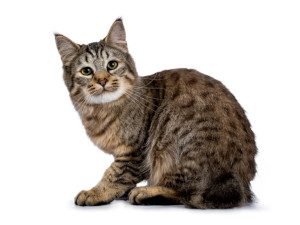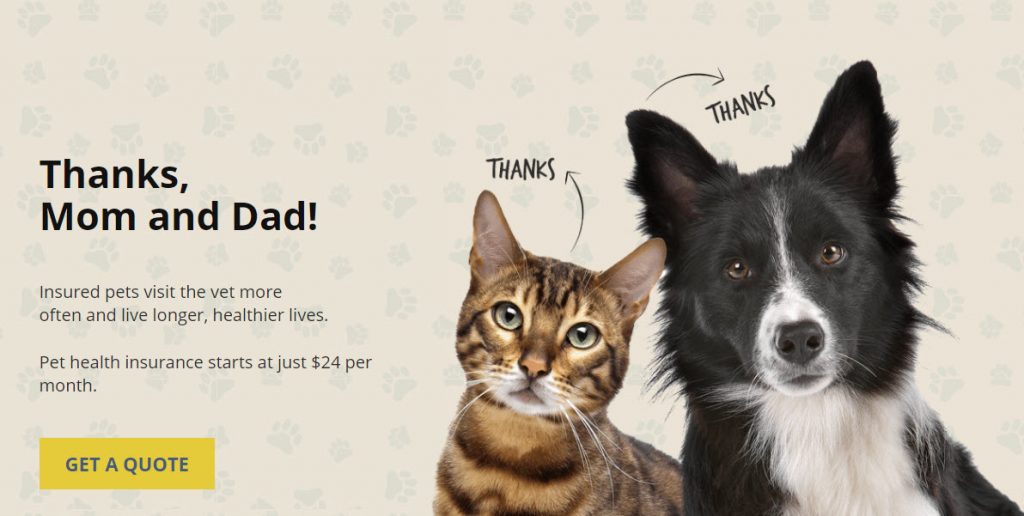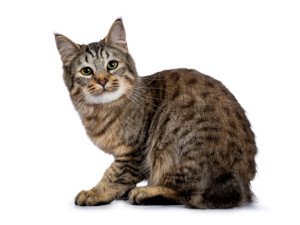Pixie-Bob Cats
Free Pet Insurance Comparison
Compare Quotes From Top Companies and Save
Secured with SHA-256 Encryption
Dr. Pippa Elliott BVMS, MRCVS
Veterinarian
Dr Pippa Elliott BVMS, MRCVS is a veterinarian with over 30 years of experience in companion animal practice. In 1987 she graduated from the University of Glasgow, with a degree in veterinary medicine and surgery. She works at Blythwood Vets and the People’s Dispensary for Sick Animals (PDSA). Pippa is an advocate of Fear-Free Practice, an animal addict, and a veterinary writer. She is also w...
Veterinarian
UPDATED: Jan 8, 2024
Pet Insurance U receives compensation from the third parties included on this site. This includes payment for clicks from our site to insurance providers’ sites and quote requests generated. Our rankings and reviews are not affected by payments from the insurance companies. The compensation we receive allows the site to be free and regularly updated. Our goal is to review every pet insurance provider, but not all companies are listed on the site.
And many of the companies we review do not pay us anything. We simply rate, compare and review their plan because we feel it will be valuable to you. Our reviews are guaranteed to be unbiased, professional and advertising compensation does not influence rankings.
We are a free online resource for anyone interested in learning more about pet insurance. Our goal is to be an objective, third-party resource for everything pet insurance related. We update our site regularly, and all content is reviewed by pet insurance experts.
UPDATED: Jan 8, 2024
Pet Insurance U receives compensation from the third parties included on this site. This includes payment for clicks from our site to insurance providers’ sites and quote requests generated. Our rankings and reviews are not affected by payments from the insurance companies. The compensation we receive allows the site to be free and regularly updated. Our goal is to review every pet insurance provider, but not all companies are listed on the site.
And many of the companies we review do not pay us anything. We simply rate, compare and review their plan because we feel it will be valuable to you. Our reviews are guaranteed to be unbiased, professional and advertising compensation does not influence rankings.
On This Page
Pixie-Bob Cats are said to have originated when a bobcat mated with a barn cat in Washington State in the 1980s.
Known for their bobbed tails, rugged look and mild temperament, these medium to large cats are brown with a dotted tabby pattern.
With this breed of cats, some may have extra toes, a condition is known as polydactyly (which causes no problems for the animal). If anything, polydactyly is sometimes associated with good luck!
Pixie-Bobs are highly social and quietly vocal. They get along well with children, dogs, and other cats, but are also fine spending time alone.
Need Pet Insurance?
FACT: Pet insurance pays up to 90% of vet bills when your pet is sick or injured!
Pixie-Bob Breed Characteristics and Personality

If you are looking for a small cat, the Pixie-Bob is not the cat for you!
Pixie-Bobs tend to be large cats with the females weighing from 9 to 13 pounds, and the males can weigh up to 24 pounds!
The Pixie-Bobs aren’t fat (well, some are) but are a long, muscular kitty which contributes to its hefty weight.
Pixie-Bobs have a very thick coat which tends to get matted if not brushed regularly. The coat has a texture that feels like wool, and they can have either short hair or long hair.
Weekly grooming will help the Pixie-Bob’s coat to remain pliable and un-matted.
Their coat is mackerel or can have a striped pattern. The Pixie-Bobs can come in many different colors but are usually light gray, light brown, or a sort of reddish color.
The Pixie-Bob’s tail is short, about two inches, and hangs low. The Pixie-bob is a rare breed in that polydactyl toes is standard to the breed, and they can have up to seven toes.
Pixie-Bob, while husky and has features like a Bobcat, are fairly mellow cats. They are not the hyperactive sort and love to hang out and observe the family. Some equate them to dogs because they love to be around kids and wherever the attention is.
If you want to take a cat for a walk on a leash, the Pixie-Bob is probably an excellent breed to try. They are very pliable and will do anything to please their pet parents.
They are intelligent cats and still need to be stimulated to thrive. Great with kids, dogs and any pets, the Pixie-Bobs are just amiable kitties.
Known more to chirp than a loud meow, if you like the quiet type of cat, the Pixie-Bob won’t meow your ear off!
Enter your ZIP code below to view companies that have cheap pet insurance rates.
Secured with SHA-256 Encryption
Common Health Problems with the Pixie-Bob Cat
Although purebred, Pixie-Bobs are relatively healthy and not prone to many illnesses as other breeds. Because the breed is often outcrossed with all different breeds, this can help with long term health issues.
Some health issues are more common to the Pixie-Bob:
Cryptorchidism
Cryptorchidism, which affects some male cats, occurs when the cat’s testicles fail to develop or descend properly. The condition can be asymptomatic or may cause pain for the cat and contribute to unwanted behaviors like spraying.
The problem is usually relieved when the cat is neutered, although the procedure may be more complicated than it would typically be.
Feline cardiomyopathy
Feline cardiomyopathy can occur in all cats and encompasses four related conditions in which the muscles of the heart become weakened or fail to function properly. Left untreated, cardiomyopathy often leads to heart failure and death.
The condition is diagnosed based on a vet examination for heart murmurs and other cardiac abnormalities. Treatment usually involves the administration of drugs that help to restore the heart’s normal rhythm.
Dystocia
Dystocia is a condition when a cat has trouble delivering a litter of kittens. While there isn’t an abundance of Pixie-Bobs with dystocia, there have been enough reported to consider it a potential health issue. The breeder should know if there have been in many cases in their specific breed.
Obesity
While not every Pixie-Bob is big, obesity can be common among the breed. It is not necessarily inherent of the breed, but Pixie-Bob owners need to be even more compliant in feeding these bigger cats a healthy diet, to keep their weight in check.
Your vet can give you a recommendation of a good diet to feed your Pixie-Bob and if your cat is at a proper weight for his size.
Does Your Pixie-Bob Need Pet Insurance?
While the Pixie-Bob cats are a relatively healthy breed, pet insurance is always a good idea to protect your cat from any health issue that can occur with your cat.
Cats that are pure-breeds tend to be more susceptible to hereditary conditions and other health issues.
Cats live a long time, and there will be long term issues that can and will occur.
Or if your cat suddenly develops a serious disease, like diabetes or cancer, you want to have the ability to give your cat the best care possible without breaking the bank.
Pet insurance will help you do just that as all of the top pet insurance companies will cover anywhere from 80% to 90% of the costs.
And when a horrible condition surfaces or your cat is rushed to the hospital for a broken paw, you will be grateful to have enrolled in pet insurance.
The one caveat is that you must have purchased pet insurance before any new illness or condition occurs, and then it will be considered pre-existing. And, no pet insurance will cover a pre-existing condition.
Just make sure to enroll your Pixie-Bob when he or she is a kitten to avoid being turned down for any condition or illness.
How To Apply for Pet Insurance
Look for a good, reputable pet insurance provider like Healthy Paws or Embrace that will cover up to 90% of the costs and for the rest of your cat’s life if they develop a long term illness.
Healthy Paws is one of our favorite pet insurance companies because they offer unlimited benefits in all their plans and even for the duration of your cat’s life.
All it takes it that one $10,000 vet bill and you will be so relieved that you purchased pet insurance for your Pixie-Bob.
If you would like to get a quote from some of the best pet insurance providers of 2019, our list of the top 8 cat insurance companies of 2019 is a great place to start!
Other articles you may find helpful:
Is Exotic Pet Insurance Necessary?
The Best Pet Insurance By State
Fun Facts, Dog FAQ, And Unsolicited Dog Advice
5 Training Commands to Save Your Dog’s Life
The Ultimate Guide to Safe Foods for Dogs
We have worked hard to provide you with all the free resources possible to help give you insight into the best pet insurance for cats, additional cat breeds info, common cat health issues, and a fun look at frequently asked cat questions.
Additional Cat Breeds:
American Curl Cat, American Wirehair Cat, Arabian Mau Cat, Ashera Cat, Balinese Cat, Burmese Cat, Chartreux Cat, Chausie Cat, Cymric Cat, Domestic Medium Hair Cat
Himalayan Cat, Japanese Bobtail Cat, Manx Cat, Nebelung Cat, Norwegian Forest Cat, Orange Tabby Cat, Oriental Cat, Persian Cat, Pixie-Bob Cat, Russian Blue Cat
Scottish Fold Cat, Selkirk Rex Cat, Siamese Cat, Siberian Cat, Singapura Cat, Somali Cat, Thai Cat, Toygers Cat, Turkish Angora Cat, LaPerm Cat, Maine Coon Cat


Frequently Asked Questions
What are the characteristics and personality of Pixie-Bob cats?
Pixie-Bob cats are known for their large size, with females weighing between 9 to 13 pounds and males up to 24 pounds. They have a thick coat that can be short or long, a mackerel or striped pattern, and a distinctive bobbed tail. These cats are mellow, intelligent, and social, making them great companions for families. They are also known to be good with kids, dogs, and other pets.
Do Pixie-Bob cats have specific health problems?
Pixie-Bob cats are generally healthy, but some common health issues may include cryptorchidism in males, feline cardiomyopathy, dystocia (difficulty giving birth), and obesity. Regular veterinary check-ups and proper care can help address these health concerns. Additionally, Pixie-Bobs are prone to polydactyl toes, a condition that doesn’t cause problems and is considered standard for the breed.
Is pet insurance necessary for Pixie-Bob cats?
Yes, pet insurance is recommended for Pixie-Bob cats to protect them from unexpected health issues, accidents, and long-term illnesses. While the breed is generally healthy, pet insurance provides financial support for veterinary expenses, ensuring that your cat receives the best possible care without breaking the bank.
Can pet insurance cover hereditary conditions in Pixie-Bob cats?
Yes, reputable pet insurance providers like Healthy Paws or Embrace cover hereditary conditions in Pixie-Bob cats. These conditions may include cryptorchidism and feline cardiomyopathy. It’s crucial to enroll your cat in pet insurance early to avoid pre-existing condition exclusions.
Are Pixie-Bob cats prone to obesity?
While not every Pixie-Bob is overweight, obesity can be common in the breed. Pet owners should be vigilant about feeding their Pixie-Bobs a healthy diet and ensuring they maintain an appropriate weight. Regular veterinary consultations can help monitor your cat’s weight and provide dietary recommendations.
How can I apply for pet insurance for my Pixie-Bob cat?
To apply for pet insurance, research reputable providers such as Healthy Paws or Embrace. Choose a plan that offers comprehensive coverage, including hereditary conditions and long-term illnesses. Enroll your Pixie-Bob when they are a kitten to avoid pre-existing condition exclusions.
What does pet insurance for Pixie-Bob cats typically cover?
Pet insurance for Pixie-Bob cats typically covers veterinary expenses for accidents, illnesses, and hereditary conditions. Coverage can include diagnostics, medications, surgeries, and other necessary treatments. Reputable providers offer plans with high reimbursement rates, ensuring that a significant portion of veterinary costs is covered.
Why is pet insurance important for purebred cats like Pixie-Bobs?
Pet insurance is important for purebred cats like Pixie-Bobs because they may be more susceptible to hereditary conditions and specific health issues. Purebreds often have unique characteristics that require specialized care, and pet insurance helps alleviate the financial burden of unexpected medical expenses.
Can pet insurance cover a Pixie-Bob cat for its entire life?
Yes, some pet insurance providers, such as Healthy Paws, offer unlimited benefits for the entire life of the pet. Choosing a plan with comprehensive coverage and unlimited benefits ensures that your Pixie-Bob can receive ongoing care for chronic conditions and long-term illnesses.
Enter your ZIP code below to view companies that have cheap pet insurance rates.
Secured with SHA-256 Encryption
Dr. Pippa Elliott BVMS, MRCVS
Veterinarian
Dr Pippa Elliott BVMS, MRCVS is a veterinarian with over 30 years of experience in companion animal practice. In 1987 she graduated from the University of Glasgow, with a degree in veterinary medicine and surgery. She works at Blythwood Vets and the People’s Dispensary for Sick Animals (PDSA). Pippa is an advocate of Fear-Free Practice, an animal addict, and a veterinary writer. She is also w...
Veterinarian
We are a free online resource for anyone interested in learning more about pet insurance. Our goal is to be an objective, third-party resource for everything pet insurance related. We update our site regularly, and all content is reviewed by pet insurance experts.


